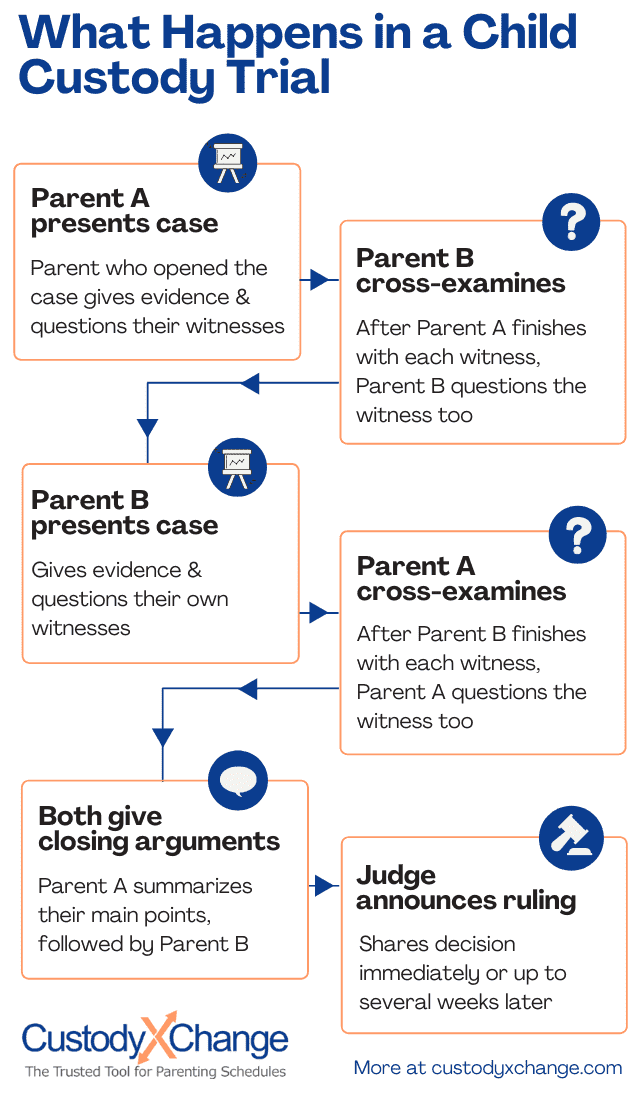South Carolina Custody & Divorce: Final Hearings, Trials
Most co-parents reach agreement on custody. If you agree with the other parent on a parenting plan — including a parenting time schedule — the judge will likely approve it at a brief final hearing.
But if you don't settle your disagreement about how to parent, your final hearing will be a trial at which the judge will make a custody decision.
Before your final hearing or trial
Discovery is the formal process of obtaining relevant information from the other parent to prepare for trial or settlement. Make sure to follow the rules in the South Carolina Code of Civil Procedure.
Mediation is required before a divorce trial. Many people reach a settlement in mediation. Those who don't can request a trial date — but only after the mediator declares they've tried mediation in good faith (which usually involves at least three hours in session).
In contested cases, the court appoints a guardian ad litem (GAL) at a temporary hearing. The GAL's job is to look out for the best interests of your child and report back to the court. They must submit their report to the court 20 days before trial (or sometimes 10 days beforehand).
If you've reached agreement, put as many details as you can in your parenting plan so it will be useful for a long time. Divorce details that aren't related to custody go into a divorce settlement agreement.
From the day you file your case, you have 365 days for either parent to request a final hearing or trial. When you're ready, ask your local court how to do this.
The court will reply with a Notice of Hearing, giving you a date that may be months in the future.
Mail a copy of the Notice of Hearing to the other parent at least 10 days before the hearing. Provide a notarized Affidavit of Mailing to the court.
What to expect at a final hearing to approve an agreement
The judge will ask each parent things like: Do you understand what you've agreed to? Do you believe it's fair? Do you think it is in the best interests of your children? Were you sober when you agreed? Were you coerced? You must answer these questions before the judge will turn your agreement into a court order.
Your final hearing will only be about 15 minutes. In some counties, it may be virtual.
What to expect at trial
It's a good idea to hire a trial lawyer. You need to follow the correct trial procedures, present the best version of your argument and make a good impression on the judge. (Family court cases don't have juries.)
On the day (or days) of your trial:
- Dress appropriately.
- Arrive early.
- Bring copies of all your court papers.
- Print any online interview or questionnaire you may have completed.
- Bring multiple copies of any documentation that supports your argument.
Children can't come to court with you.

If you are representing yourself (i.e., you don't have a lawyer), be aware of specific rules like:
- When you ask a question, you may object that the witness is "refusing to answer," being "hostile" or "argumentative," lacks "personal knowledge," or is "volunteering information" you didn't ask for.
- When the other parent (or their lawyer) questions you or another witness, you can object that a question is "irrelevant" or risks "unfair prejudice."
Evidence you submitted at previous hearings, if it remains relevant to your case, will also need to be submitted into the record at the final hearing. You can also show new evidence, which may include types of evidence you weren't allowed to show at the temporary hearing (e.g., audio, video, text messages and social media posts). You can testify and call witnesses.
The judge may sign the final order at the hearing. If they don't, you'll receive it in the mail.
The trial could be online. Each family court judge has their own virtual courtroom.
Using technology for your trial
Custody trials require serious organization.
You may need to propose parenting time schedules, suggest a parenting plan, show messages from the other parent and more.
The Custody X Change online app lets you create and manage all of these elements in one place. With customizable parenting time calendars, a parenting plan template, printable parent-to-parent messaging and beyond, it helps you prepare for every step of your case.
Take advantage of custody technology to get what's best for your child.
